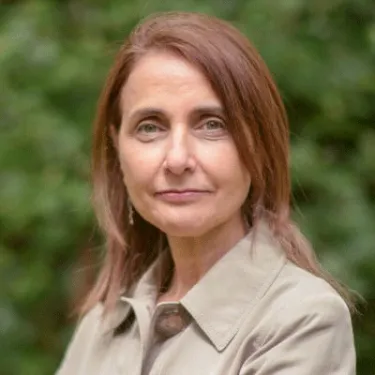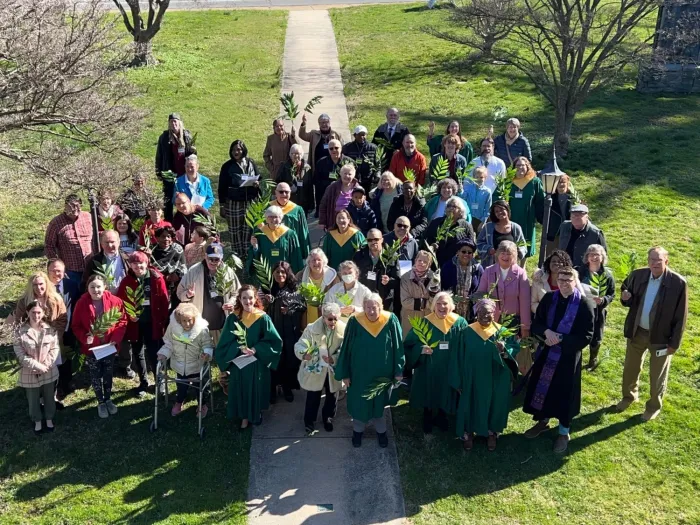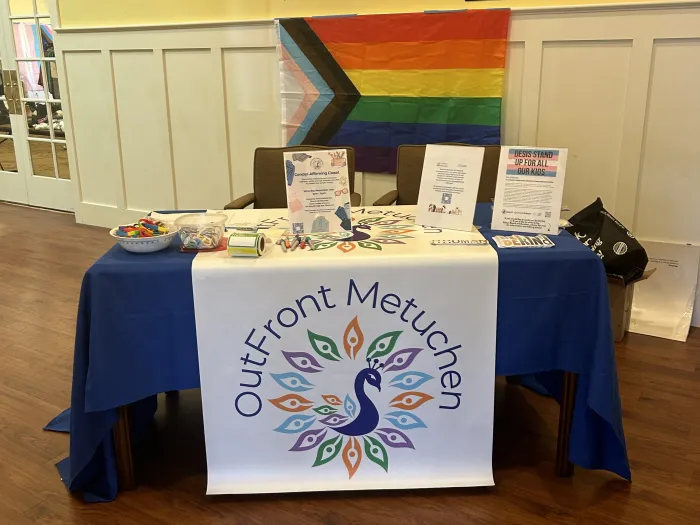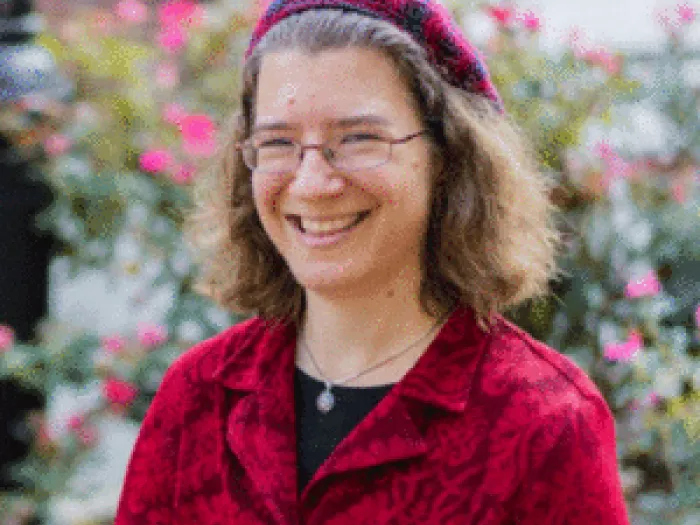Ecumenical Advocacy Days Spring Summit attendees hold a prayer vigil at the Pentagon
They also hear from Joyce Ajlouny, general secretary of the American Friends Service Committee


ARLINGTON, Virginia — Walking north from their conference center to the Pentagon during a heavy rainfall on Saturday, Ecumenical Advocacy Days Spring Summit attendees held a prayer vigil seeking God’s help bringing peace to people and places across the world that need it the most.
Once they’d completed the nearly mile-long trek, those attending the gathering — including staff members of Presbyterian Church (U.S.A.)’s Office of Public Witness — heard from Joyce Ajlouny, general secretary of the American Friends Service Committee, a longtime partner of the PC(USA).
A Palestinian American, Ajlouny started her career working in international development in Palestine, focusing on minority and refugee rights, gender equality, economic development and humanitarian support.
“The struggle for peace and justice could not be more urgent, around the world and here in the U.S.,” said Ajlouny, who’d just returned from visiting family and engaging with staff in Palestine and Jordan. “As you can imagine,” Ajlouny said, “conditions are alarming. We have never witnessed such profound despair.”
“We don’t have words anymore. We really don’t,” she said. “There are no words in our language that can adequately convey the agony we feel. No words exist to describe the anger that burns within us towards the world that allows the cruel annihilation of our people in Gaza.”
“Our hearts and minds are always transfixed on the people of Gaza,” Ajlouny said. “When I was there, staff shared with me how the West Bank had become even more dangerous, with settler and military violence on the rise.”
“Our staff in Gaza have been serving hot meals. They are such a courageous bunch,” she said. “We have open-air kitchens. We host recreational activities for children and teens.” Since the Oct. 7 Hamas attacks and the Israeli response, “we have provided humanitarian and life-saving aid to more than 552,000 people.” Staff members “continue to provide this aid as they face unbearable personal trauma,” including bombardment and the loss of family members, she said.
One staff member wrote that “we are stuck in the middle of Gaza with no means and the bare minimum for life. People are sleeping on the streets now with no tent or even a sheet covering their head. The situation is getting worse, but we are still on the ground … I’ll never stop saying this: every single thing we provide saves lives.”

“Just this week we learned that President Biden is moving forward with another $1 billion arms sale to Israel,” Ajlouny said. “So yes, we need a permanent ceasefire, and we need an arms embargo. President Biden has the power to stop the assault on Gaza. We will keep marching and calling and protesting and, yes, praying, until he does.”
Each year, U.S. taxpayers provide around $825 billion “so this building can be in operation,” she said, referring to the Pentagon. “Much of that money goes to weapons manufacturers” and to companies that produce technology “used for war and oppression.”
“At American Friends Service Committee, we focus not just on state actions, but on the corporations benefitting from oppressive systems,” including mass incarceration and immigrant retention,” Ajlouny said. The AFSC published this list of corporations that directly benefit from the assault on Gaza.
“Investing in peace actually works,” she said. “This is money that could instead go to health care, housing, climate change, job programs and poverty elimination.”
“Instead of investing in a community-centered future,” Ajlouny said, “the U.S. government continues to militarize the police and the world, no matter who is in the White House.”
AFSC was founded in 1917 to support the needs of conscientious objectors to the Great War, as World War I was known then. “We knew even then that war and militarism led to death and destruction,” she said. “We need a new vision of global security, one that is centered in dialogue, human rights, self-determination” and finding common ground in shared problems.

“As Quakers,” Ajlouny said of the AFSC, “we believe the light of God is in all of us. While it is is a difficult and devastating time in the world, I am heartened to see that light amplified through the beautiful networks in all of you, each and every one of you — networks of strength and solidarity that continue, against the odds, to grow towards a just and lasting peace.”
This is what it will take to bring about peace, she said: “It takes us to pledge, to take action, and to stand on the right side of history. That’s the type of pressure we need to put on our policy leaders in the Congress and in the White House, and on corporations.”
“Thank you for your witness, for your courage, and for standing on the right side of history,” Ajlouny said. “I promise you that you are, and time will tell. Thank you.”
You may freely reuse and distribute this article in its entirety for non-commercial purposes in any medium. Please include author attribution, photography credits, and a link to the original article. This work is licensed under a Creative Commons Attribution-NonCommercial-NoDeratives 4.0 International License.




